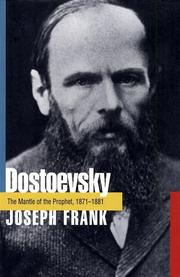| Listing 1 - 2 of 2 |
Sort by
|

ISBN: 9780691115696 0691115699 0691209367 Year: 2003 Publisher: Princeton ; Oxford Princeton University Press
Abstract | Keywords | Export | Availability | Bookmark
 Loading...
Loading...Choose an application
- Reference Manager
- EndNote
- RefWorks (Direct export to RefWorks)
This fifth and final volume of Joseph Frank's justly celebrated literary and cultural biography of Dostoevsky renders with a rare intelligence and grace the last decade of the writer's life, the years in which he wrote A Raw Youth, Diary of a Writer, and his crowning triumph: The Brothers Karamazov. Dostoevsky's final years at last won him the universal approval toward which he had always aspired. While describing his idiosyncratic relationship to the Russian state, Frank also details Doestoevsky's continuing rivalries with Turgenev and Tolstoy. Dostoevsky's appearance at the Pushkin Festival in June 1880, which preceded his death by one year, marked the apotheosis of his career--and of his life as a spokesman for the Russian spirit. There he delivered his famous speech on Pushkin before an audience stirred to a feverish emotional pitch: "Ours is universality attained not by the sword, but by the force of brotherhood and of our brotherly striving toward the reunification of mankind." This is the Dostoevsky who has entered the patrimony of world literature, though he was not always capable of living up to such exalted ideals. The writer's death in St. Petersburg in January of 1881 concludes this unparalleled literary biography--one truly worthy of Dostoevsky's genius and of the remarkable time and place in which he lived.
882 "18" DOSTOEVSKIJ, FEDOR MIHAILOVIC --- Russische literatuur--19e eeuw. Periode 1800-1899--DOSTOEVSKIJ, FEDOR MIHAILOVIC --- 882 "18" DOSTOEVSKIJ, FEDOR MIHAILOVIC Russische literatuur--19e eeuw. Periode 1800-1899--DOSTOEVSKIJ, FEDOR MIHAILOVIC --- Dostoyevsky, Fyodor, --- Pisarze rosyjscy --- Dostojewski, Fiodor --- Dostoevskij, Fëdor Mihajlovič --- Russia --- Intellectual life --- Soviet Union --- Anna Karenina. --- Catechism of a Revolutionary. --- Childhood and Boyhood. --- Crisis in Western Philosophy. --- David Copperfield. --- Downtrodden People. --- Epoch. --- Evgeny Onegin. --- Life of a Great Sinner. --- Little Hero. --- Mimochka. --- Petersburg Almanac. --- Raw Youth. --- Skladchina. --- The Brothers Karamazov. --- The Dream of a Ridiculous Man. --- The Eternal Husband. --- The Landlady. --- The Old Curiosity Shop. --- The Queen of Spades. --- The Tale of the Bear. --- anti-Semitism. --- atheism. --- narodnichestvo.
Book
ISBN: 1280494182 9786613589415 1400842182 069111417X 0691159548 9781400842186 9780691114170 9781280494185 9780691159546 Year: 2012 Publisher: Princeton ; Oxford Princeton University Press
Abstract | Keywords | Export | Availability | Bookmark
 Loading...
Loading...Choose an application
- Reference Manager
- EndNote
- RefWorks (Direct export to RefWorks)
How to Do Things with Books in Victorian Britain asks how our culture came to frown on using books for any purpose other than reading. When did the coffee-table book become an object of scorn? Why did law courts forbid witnesses to kiss the Bible? What made Victorian cartoonists mock commuters who hid behind the newspaper, ladies who matched their books' binding to their dress, and servants who reduced newspapers to fish 'n' chips wrap? Shedding new light on novels by Thackeray, Dickens, the Brontës, Trollope, and Collins, as well as the urban sociology of Henry Mayhew, Leah Price also uncovers the lives and afterlives of anonymous religious tracts and household manuals. From knickknacks to wastepaper, books mattered to the Victorians in ways that cannot be explained by their printed content alone. And whether displayed, defaced, exchanged, or discarded, printed matter participated, and still participates, in a range of transactions that stretches far beyond reading. Supplementing close readings with a sensitive reconstruction of how Victorians thought and felt about books, Price offers a new model for integrating literary theory with cultural history. How to Do Things with Books in Victorian Britain reshapes our understanding of the interplay between words and objects in the nineteenth century and beyond.
Books and reading --- Books --- Book industries and trade --- English fiction --- Books and reading in literature. --- Books in literature. --- Book trade --- History --- Psychological aspects --- Social aspects --- History and criticism. --- Great Britain --- Library materials --- Publications --- Bibliography --- Cataloging --- International Standard Book Numbers --- Cultural industries --- Manufacturing industries --- Books and reading in literature --- Books in literature --- History and criticism --- Anthony Trollope. --- David Copperfield. --- Enlightenment. --- Evangelical publishers. --- George Gissing. --- Henry Mayhew. --- Victorians. --- antisocial genre. --- authors. --- bildungsroman. --- book buying. --- book handling. --- book preservation. --- book selling. --- book transactions. --- books. --- circulation. --- coffee-table book. --- cultural history. --- electronic media. --- household manual. --- identity. --- junk mail. --- life writing. --- literary criticism. --- literary theory. --- metonymy. --- mid-Victorian novels. --- newspaper. --- niche marketing. --- novel. --- novels. --- paper recycling. --- paper taxes. --- plastics. --- printed matter. --- reader response. --- readerly rule. --- readers. --- reading. --- religious tracts. --- scholars. --- secular fiction. --- secular novelists. --- secular press. --- self-help. --- selfhood. --- shared reading. --- social entanglements. --- text. --- tract distribution. --- unread book. --- urban sociology. --- verbal content. --- wood-pulp paper. --- writing. --- Book history --- Psychological study of literature --- anno 1800-1899
| Listing 1 - 2 of 2 |
Sort by
|

 Search
Search Feedback
Feedback About UniCat
About UniCat  Help
Help News
News